“an old man with no destiny with our never knowing who he was, or what he was like, or even if he was only a figment of the imagination, a comic tyrant who never knew where the reverse side was and where the right of this life which we loved with an insatiable passion that you never dared even to imagine out of the fear of knowing what we knew only too well that it was arduous and ephemeral but there wasn’t any other, general, because we knew who we were while he was left never knowing it forever with the soft whistle of his rupture of a dead old man cut off at the roots by the slash of death, flying through the dark sound of the last frozen leaves of his autumn toward the homeland of shadows of the truth of oblivion, clinging to his fear of the rotting cloth of death’s hooded cassock and alien to the clamor of the frantic crowds who took to the streets singing hymns of joy at the jubilant news of his death and alien forevermore to the music of liberation and the rockets of jubilation and the bells of glory that announced to the world the good news that the uncountable time of eternity had come to an end.”
Cautionary Tales: Passages From Dystopian Novels Over The Years
Animal Farm to The Hunger Games, passages from dystopian novels over the years
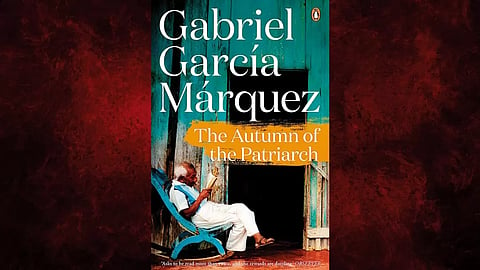
— Excerpts from The Autumn of the Patriarch by Gabriel Garcia Marquez. Translated by Gregory Rabassa
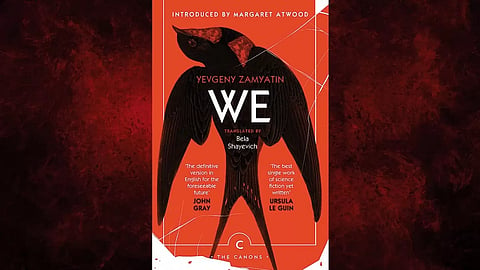
An Announcement
The Wisest of Lines
A Poem
This is merely a copy, word by word, of what was published this morning in the State newspaper:
“In another hundred and twenty days the building of the Integral will be completed. The great historic hour is near, when the first Integral will rise into the limitless space of the universe. A thousand years ago your heroic ancestors subjected the whole earth to the power of the United State. A still more glorious task is before you: the integration of the indefinite equation of the Cosmos by the use of the glass, electric, fire-breathing Integral. Your mission is to subjugate to the grateful yoke of reason the unknown beings who live on other planets, and who are perhaps still in the primitive state of freedom. If they will not understand that we are bringing them a mathematically faultless happiness, our duty will be to force them to be happy. But before we take up arms, we shall try the power of words.
In the name of The Well-Doer, the following?is announced herewith to all Numbers of the United State:
“Whoever feels capable must consider it his duty to write treatises, poems, manifestoes, odes and other compositions on the greatness and the beauty of the United State.
“This will be the first load which the?Integral?will carry.
— Excerpts from We by Yevgeny Zamyatin. Translated by Gregory Zilboorg
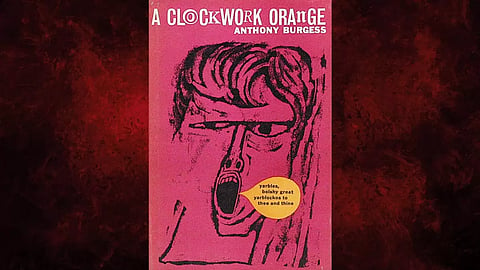
More, badness is of the self, the one, the you or me on our oddy knockies, and that self is made by old Bog or God and is his great pride and radosty. But the not-self cannot have the bad, meaning they of the government and the judges and the schools cannot allow the bad because they cannot allow the self.
— Excerpts from A Clockwork Orange by Anthony Burgess
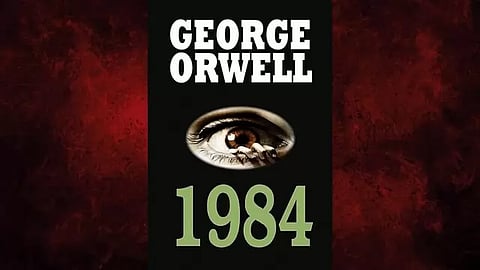
Winston kept his back turned to the telescreen. It was safer, though, as he well knew, even a back can be revealing. A kilometre away the Ministry of Truth, his place of work, towered vast and white above the grimy landscape. This, he thought with a sort of vague distaste -- this was London, chief city of Airstrip One, itself the third most populous of the provinces of Oceania. He tried to squeeze out some childhood memory that should tell him whether London had always been quite like this. Were there always these vistas of rotting nineteenth-century houses, their sides shored up with baulks of timber, their windows patched with cardboard and their roofs with corrugated iron, their crazy garden walls sagging in all directions? And the bombed sites where the plaster dust swirled in the air and the willow-herb straggled over the heaps of rubble; and the places where the bombs had cleared a larger patch and there had sprung up sordid colonies of wooden dwellings like chicken-houses? But it was no use, he could not remember: nothing remained of his childhood except a series of bright-lit tableaux occurring against no background and mostly unintelligible.
The Ministry of Truth—Minitrue, in Newspeak—was startlingly different from any other object in sight. It was an enormous pyramidal structure of glittering white concrete, soaring up, terrace after terrace, 300 metres into the air. From where Winston stood it was just possible to read, picked out on its white face in elegant lettering, the three slogans of the Party:
War Is Peace
Freedom Is Slavery
Ignorance Is Strength
— Excerpts from George Orwell’s 1984
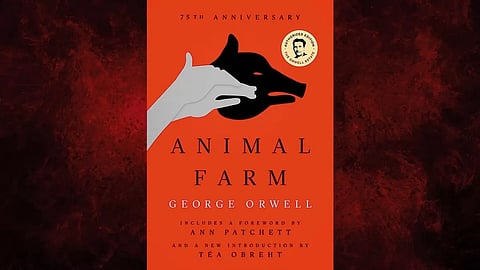
As for the others, their life, so far as they knew, was as it had always been. They were generally hungry, they slept on straw, they drank from the pool, they laboured in the fields; in winter they were troubled by the cold, and in summer by the flies. Sometimes the older ones among them racked their dim memories and tried to determine whether in the early days of the Rebellion, when Jones’s expulsion was still recent, things had been better or worse than now. They could not remember. There was nothing with which they could compare their present lives: they had nothing to go upon except Squealer’s lists of figures, which invariably demonstrated that everything was getting better and better. The animals found the problem insoluble; in any case, they had little time for speculating on such things now. Only old Benjamin professed to remember every detail of his long life and to know that things never had been, nor ever could be much better or much worse–hunger, hardship, and disappointment being, so he said, the unalterable law of life.
— Excerpts fromGeorge Orwell’s Animal Farm
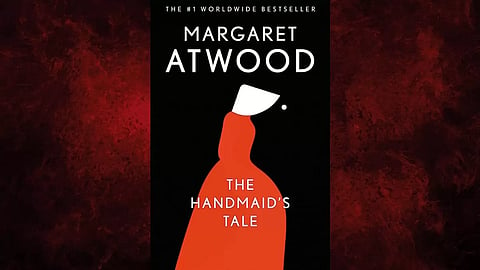
I would like to believe this is a story I’m telling. I need to believe it. I must believe it. Those who can believe that such stories are only stories have a better chance.
If it’s a story I’m telling, then I have control over the ending. Then there will be an ending, to the story, and real life will come after it. I can pick up where I left off.
It isn’t a story I’m telling.
It’s also a story I’m telling, in my head, as I go along.
Tell, rather than write, because I have nothing to write with and writing in any case is forbidden.?But if it’s a story, Even in my head, I must be telling it to someone. You don’t tell a story only to yourself. There’s always someone else.
Even when there is no one.
A story is like a letter.?Dear You, I’ll say. Just?you, without a name. Attaching a name attaches?you?to the world of fact, which is riskier, more hazardous: who knows what the chances are out there, of survival, yours? I will say?you, you, like an old love song.?You?can mean more than one.
You?can mean thousands.
I’m not in any immediate danger, I’ll say to you.
I’ll pretend you can hear me.
But it’s no good, because I know you can’t.
— Excerpts from The Handmaid’s Tale by Margaret Atwood
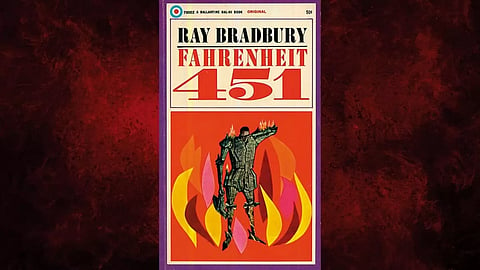
“Now let’s take up the minorities in our civilization, shall we? Bigger the population, the more minorities. Don’t step on the toes of the dog-lovers, the cat-lovers, doctors, lawyers, merchants, chiefs, Mormons, Baptists, Unitarians, second-generation Chinese, Swedes, Italians, Germans, Texans, Brooklynites, Irishmen, people from Oregon or Mexico. The people in this book, this play, this TV serial are not meant to represent any actual painters, cartographers, mechanics anywhere. The bigger your market, Montag, the less you handle controversy, remember that! All the minor minor minorities with their navels to be kept clean. Authors, full of evil thoughts, lock up your typewriters. They did. Magazines became a nice blend of vanilla tapioca. Books, so the damned snobbish critics said, were dishwater. No wonder books stopped selling, the critics said. But the public, knowing what it wanted, spinning happily, let the comic books survive. And the three-dimensional sex-magazines, of course. There you have it, Montag. It didn’t come from the Government down. There was no dictum, no declaration, no censorship, to start with, no! Technology, mass exploitation, and minority pressure carried the trick, thank God. Today, thanks to them, you can stay happy all the time, you are allowed to read comics, the good old confessions, or trade journals.”
“Yes, but what about the firemen, then?” asked Montag.
“Ah.” Beatty leaned forward in the faint mist of smoke from his pipe. “What more easily explained and natural? With school turning out more runners, jumpers, racers, tinkerers, grabbers, snatchers, fliers, and swimmers instead of examiners, critics, knowers, and imaginative creators, the word ‘intellectual,’ of course, became the swear word it deserved to be. You always dread the unfamiliar. Surely you remember the boy in your own school class who was exceptionally ‘bright,’ did most of the reciting and answering while the others sat like so many leaden idols, hating him. And wasn’t it this bright boy you selected for beatings and tortures after hours? Of course it was. We must all be alike. Not everyone born free and equal, as the Constitution says, but everyone made equal. Each man the image of every other; then all are happy, for there are no mountains to make them cower, to judge themselves against.?So! A book is a loaded gun in the house next door. Burn it. Take the shot from the weapon.
—? Excerpts from Fahrenheit 451 by Ray Bradbury
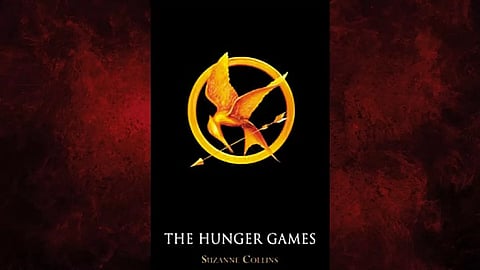
Just as the town clock strikes two, the mayor steps up to the podium and begins to read. It’s the same story every year. He tells of the history of Panem, the country that rose up out of the ashes of a place that was once called North America. He lists the disasters, the droughts, the storms, the fires, the encroaching seas that swallowed up so much of the land, the brutal war for what little sustenance remained. The result was Panem, a shining Capitol ringed by thirteen districts, which brought peace and prosperity to its citizens. Then came the Dark Days, the uprising of the districts against the Capitol. Twelve were defeated, the thirteenth obliterated. The Treaty of Treason gave us the new laws to guarantee peace and, as our yearly reminder that the Dark Days must never be repeated, it gave us the Hunger Games.
The rules of the Hunger Games are simple. In punishment for the uprising, each of the twelve districts must provide one girl and one boy, called tributes, to participate. The twenty-four tributes will be imprisoned in a vast outdoor arena that could hold anything from a burning desert to a frozen wasteland. Over a period of several weeks, the competitors must fight to the death. The last tribute standing wins.
Taking the kids from our districts, forcing them to kill one another while we watch — this is the Capitol’s way of reminding us how totally we are at their mercy. How little chance we would stand of surviving another rebellion. Whatever words they use, the real message is clear. “Look how we take your children and sacrifice them and there’s nothing you can do. If you lift a finger, we will destroy every last one of you. Just as we did in District Thirteen.”
— Excerpts from The Hunger Games by Suzanne Collins
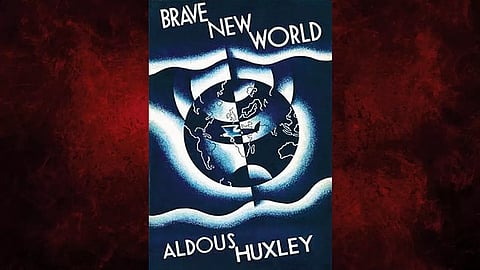
Our Ford—or Our Freud, as, for some inscrutable reason, he chose to call himself whenever he spoke of psychological matters—Our Freud had been the first to reveal the appalling dangers of family life. The world was full of fathers—was therefore full of misery; full of mothers—therefore of every kind of perversion from sadism to chastity; full of brothers, sisters, uncles, aunts—full of madness and suicide.
“And yet, among the savages of Samoa, in certain islands off the coast of New Guinea…”
The tropical sunshine lay like warm honey on the naked bodies of children tumbling promiscuously among the hibiscus blossoms. Home was in any one of twenty palm-thatched houses. In the Trobriands conception was the work of ancestral ghosts; nobody had ever heard of a father.
“Extremes,” said the Controller, “meet. For the good reason that they were made to meet.”
— Excerpts from Brave New World by Aldous Huxley